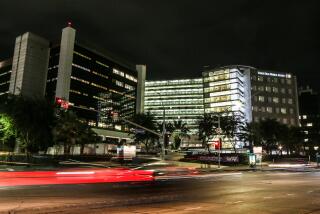He Smells a Rat in Hospital Debate
- Share via
The battle between homeowners wishing to keep their streets uncongested and the Cedars-Sinai Medical Center struggling to increase its research facilities is a microcosm of larger contests. At the heart of all these contests is the king rat syndrome.
The king rat syndrome refers to the action of the most powerful rat in a classic experiment on the effects of overpopulation. The experiment permitted a population of Norway rats to propagate freely, with unlimited food and water, in a large cage. When a comfortable number of rats occupied the cage, all parts of the cage were accessible to all the rats. As the number of rats increased beyond a comfortable number, the competition for the most attractive parts of the cage became fierce. A very obvious pecking order developed under these conditions, with the strongest male rat commandeering the most attractive corner of the cage and preventing all but a few select female rats to use it. Having appropriated a corner of the cage for his own use and pleasure, the king rat ignored the remaining rats except to defend his fiefdom, were any other rat so dumb as to attack him. When he felt so inclined, he felt free to visit other parts of the cage, but he never permitted the inferior male rats to visit his fiefdom.
California homeowners have been acting like king rats for the last 10 years. They approved Proposition 13 to keep their property taxes but continued to demand a high level of government services. They approved Proposition U in Los Angeles so as to minimize the impact of increasing population on their residential neighborhoods, even as they take advantage of the economies of scale and of the synergistic function of multidisciplinary work made possible by high-rise office buildings in other parts of the city. They have special parking districts so that they can park on city streets without having to compete with outsiders, even as they complain about lack of parking in other areas of the city where they shop and seek entertainment. In all these instances the homeowners have acted to preserve their fiefdoms without concern for the impact of their actions on the greater common good.
The end result of king rat defenses of personally controlled resources has been a steady erosion in the quality of services available to all, including medical care, libraries, higher education and public recreational facilities. The residents of West Hollywood and Beverly Hills who live within five miles of Cedars-Sinai are the chief beneficiaries of the clinical services available at the hospital. Nonetheless, they seem to be generally opposed to any expansion of Cedars-Sinai that would increase the traffic congestion around their neighborhood. They oppose the expansion of Cedars-Sinai research facilities, even though the expansion of research facilities is the expansion likely to have the smallest impact on additional traffic congestion, as compared with expansion of clinical or administrative facilities. In short, the residents oppose any expansion.
Future progress in medicine, in commercial services, in education, in information retrieval, in transportation and in government hinges on the ability of organizations to increase the density of their workplaces over time. Increasingly large teams of people with different professional backgrounds are needed to create the new products and services that will contribute to our future prosperity. It is no accident that UCLA occupies some of the tallest buildings on the Westside. The lone entrepreneur epitomized by Thomas Edison is rarely seen anymore. But even as Angelenos aspire for their city to contribute to future economic prosperity, their support for a law that restricts the height of new buildings (Proposition U) suggests that they want such prosperity at no cost to themselves in terms of increased taxes or decreased convenience. They want to be king rats, free to sample from the world around them, but loath to share their personally controlled resources with others. Their selfish choices now reduce benefits that we all could have enjoyed in future years.
WILLIAM J. McCARTHY
Adjunct Assistant Professor
UCLA Psychology Department
More to Read
Sign up for Essential California
The most important California stories and recommendations in your inbox every morning.
You may occasionally receive promotional content from the Los Angeles Times.










